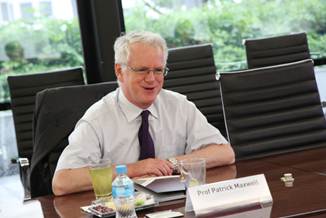
Humans can survive a few weeks without food and a few days without water. But just a few minutes without this crucial element and your brain will start to shut down, resulting in what makes the physical you you disappearing.
This essential element is, of course, oxygen.

Our body’s cells are highly sensitive to the levels of oxygen within them.
Now, this may sound like common sense, considering how crucial oxygen is to our survival; however, this was really only discovered a few decades ago.
EPO and the kidney
University of Cambridge Regius Professor of Physic and School of Clinical Medicine head Dr Patrick Maxwell was one of those involved in the discovery.

Then a UK Medical Research Council clinical training fellow at Oxford University, Prof Maxwell was working under Prof Sir Peter Ratcliffe who was looking into the regulation of erythropoietin.
Prof Maxwell explains: “We started off on this because we were interested in red blood cell production. The red blood cells carry the oxygen in your blood.
“And if, for example, you go up a mountain and there’s less oxygen in the air, your red blood cells are carrying less oxygen from your lungs to the tissues in your body, and that leads to a signal to make more red blood cells.
“And that’s done by a hormone called erythropoietin, or EPO.”
As a nephrologist, he was naturally interested in the fact that it is our kidneys that produce EPO.
“So it’s very common when patients develop kidney disease, they don’t make enough of this hormone. And so, they don’t have enough red blood cells and they become anaemic,” he says.
Anaemia can cause fatigue, weakness, dizziness, shortness of breath, chest pain, and coldness in your hands and feet, among other symptoms.
If left untreated, it can eventually lead to heart failure, as the heart has to work harder and harder to pump more blood to the body to compensate for the decreased levels of oxygen.
Prof Maxwell notes that when he first started training as a nephrologist in the 1980s, most chronic kidney disease (CKD) patients had to have regular blood transfusions to boost their red blood cell levels as a result of decreased EPO production.
He explains that this usually occurs in the late stages of CKD – stages 4 and 5 – where the kidney is only functioning at about 15%-25% capacity.
However, there were a few problems with using blood transfusions as treatment for CKD patients.
“It used to be quite easy, with blood transfusions, to transmit infections like hepatitis,” he explains.
“Also, every time you get a blood transfusion, you get immune signals from another person (the donor), so you develop antibodies to those, and that makes it more difficult to do a kidney transplant in the future.”
Fortunately, it was around this time that the gene for EPO was identified, enabling the hormone to be mass-produced via recombinant DNA technology in cell cultures.
Nowadays, instead of receiving blood transfusions, CKD patients are given regular subcutaneous (under the skin) injections of EPO to stimulate their own bone marrow to produce sufficient red blood cells for their body’s needs.
However, even this treatment has its problems.
“One of the disappointments about EPO treatment is that if you induce a normal level of red blood cells with EPO, that seems to increase the rate of heart attacks and death – not by a lot, but a bit.
“So, in America, the FDA (Food and Drug Administration) has made it clear that you shouldn’t use too much EPO,” says Prof Maxwell.
He explains that due to this, doctors currently aim for a slightly lower level of red blood cells in CKD patients than normal healthy people, i.e. a haemoglobin level of 10.5 g/dL versus a normal level of 12g/dL.
He adds that this lower level of haemoglobin still allows patients to carry out their normal activities without difficulty.
Oxygen, breathing, respiration, genes, genetic mutation, Prof Dr Patrick Maxwell, red blood cells, EPO, erythropoietin, Star2.com
Prof Maxwell indicates how very small changes in oxygen levels within a cell can be sensed via a molecular reaction that utilises the gas. Photo: The Star/Kamarul Ariffin
Influencing metabolism
A solution to this problem may be in the offing, however, thanks to the work Prof Maxwell and his colleagues have put in over the decades.
“What I was interested in,” he shares, “was how does the kidney work out the amount of oxygen coming in the blood and know to make more EPO, and why does that go wrong in kidney disease.”
After a whole lot of time, work and experiments, Prof Maxwell says the results can be summarised into two main discoveries.
The first one, as mentioned above, was that all cells have a way of sensing oxygen, and this is how our kidney cells know when to produce more EPO.
“So, every cell is sensing how much oxygen there is, and they are using that to influence their own behaviour by turning genes on and off,” he says.
One important example of this is in cancer.
While normal cells stop growing when they lack sufficient oxygen, cancer cells have learnt how to send out signals indicating that they have low oxygen levels, which triggers the growth of blood vessels to them in order to supply them with more oxygen.
In fact, one class of anti-cancer drugs called anti-angiogenics is specifically targeted at stopping tumours from growing new blood vessels.
“The other big discovery was working out, at a molecular level, how the cells sense the amount of oxygen.
“And they do that in a molecular reaction that absolutely requires oxygen, so if there’s no oxygen, the reaction doesn’t work,” explains Prof Maxwell.
He adds that the molecular reaction acts like a sensor that detects the concentration of oxygen in the cell, which then serves to turn certain genes on and off, depending on how much oxygen there is.
“An important thing about that is that this ‘sensor’ is possible to alter with drugs. So you can give a drug that makes the cell behave as if there is less oxygen than what there actually is,” he says.
For CKD patients, such a drug would mean that the body can be tricked into making more EPO on its own, thus removing the need for synthetic EPO injections.
Prof Maxwell shares that there are currently around six companies developing such drugs, with the most advanced one nearing completion of its phase III clinical trial.
He adds that: “Perhaps the most exciting thing about that is that this may be a good way of protecting organs when they have less blood supply.
“And the situations where this might be helpful are in a heart attack, when your heart muscle isn’t getting enough oxygen, or a stroke, where a bit of your brain is not getting enough oxygen.
“So, potentially, if you give such a drug that turns on this mechanism in the brain, for example, when you’re having a stroke, then that would help the brain tissue to survive and make the stroke less serious.”
He explains that when there is a catastrophic loss of oxygen to the cells, as in the case of a heart attack or stroke, the oxygen “sensor” does not seem to react to the loss of oxygen for some currently-unknown reason.
However, when a drug that influences the “sensor” into reacting as if there is less oxygen in the cell is introduced into experimental mice and rats that are experiencing a (induced) heart attack or stroke, it triggers off a series of self-preservation pathways within the affected cells.
“So, I think the ‘sensor’ works best when it’s just responding to quite minor changes (in oxygen levels) that happen normally, and once you get a catastrophe like the blood flow stopping, then a number of other things are happening, and that seems to turn the ‘sensor’ off,” says Prof Maxwell.
If this protective effect translates into humans, he predicts that this type of drugs would completely replace EPO for CKD patients.
Prof Maxwell was in town recently at the invitation of Sunway University as part of their collaboration with Cambridge to establish the Sunway Clinical Research Centre as a Regional Site Partner of Cambridge’s School of Clinical Medicine.
Source:- The Star

Leave a Reply